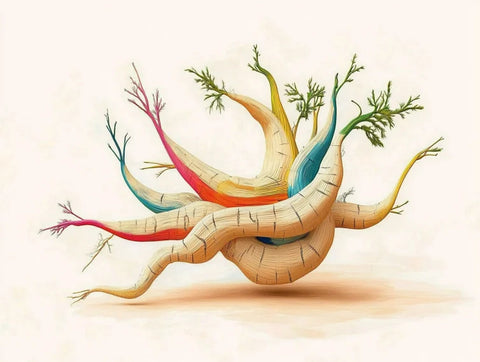Want to join the club?
mUnderstanding Why They Happen and Natural Remedies for Relief
Hot flashes and night sweats are one of the most common and well-known symptoms of menopause, affecting up to 75% of women during the menopause transition.
Hot-flashes involve sudden waves of heat, often accompanied by sweating, flushing, and a rapid heartbeat, can disrupt daily life and sleep. At their core, hot flashes result from hormonal fluctuations—particularly a decline in estrogen—that affect the body’s ability to regulate temperature.
If you’ve been wondering how to stop hot flashes and night sweats, the good news is that while there isn’t a one-size-fits-all cure, there are many ways to reduce how often and how intensely they occur. Lifestyle changes, such as incorporating phytoestrogen-rich foods like soy or flaxseeds, practicing stress-reducing activities like yoga, and exploring herbal supplements such as black cohosh, can offer relief.
In this article, we’ll break down the science behind hot flashes and provide tips to help you manage them naturally and effectively.
What are Hot Flashes?
At the core of hot flashes is the decline in estrogen levels, a key hormone produced by the ovaries, as we approach menopause. Estrogen plays a critical role in regulating the body’s temperature and maintaining thermoregulation. As its levels change, the hypothalamus, the part of the brain responsible for temperature regulation, becomes more sensitive to minor changes in estrogen levels.
This increased sensitivity leads to a disruption in the hypothalamus’ ability to regulate body temperature effectively. Consequently, the hypothalamus might perceive even minor fluctuations in estrogen as substantial changes in body temperature, starting the body's cooling mechanism. This response includes the dilation of blood vessels and increased sweating, aimed at dissipating heat and lowering body temperature.
The sudden widening of blood vessels near the skin and the release of sweat can cause a strong feeling of heat. This is often followed by a fast heartbeat and red skin. While hot flashes primarily affect the upper body, such as the face, neck, and chest, some women may also experience a sudden feeling of warmth throughout their entire body.
Why do Hot Flashes Occur at Night?
Hot flashes (or night sweats) often happen at night because the body’s core temperature naturally drops when we sleep. This can trigger the hypothalamus to confuse these changes as overheating. Hormonal changes, like lower estrogen levels, increase this sensitivity. This makes nighttime a common time for hot flashes and night sweats to interrupt sleep.
Duration of Hot Flashes
The duration of hot flashes can greatly vary among each individual and is influenced by various factors. Hot flashes can happen during the menopause transition leading up to menopause and may continue for some time after menopause has taken place. Here are some key points to consider regarding the duration of hot flashes:
Perimenopause
Hot flashes can start during perimenopause, which is the transitional period leading up to menopause. Perimenopause can begin in a woman's early 40s or even earlier, and during this time, hormonal changes become more noticeable. This leads to the onset of hot flashes in some women.
Menopause
Menopause is officially confirmed when we have not had a menstrual period for 12 consecutive months. Hot flashes are typically most prevalent during this time, as the hormonal changes and decline in estrogen levels are at their peak.
Post-Menopause
After menopause, hot flashes may continue for some, but their frequency and intensity decrease over time as the hypothalamus adjusts to the new baseline of estrogen. The duration of post-menopausal hot flashes can vary from a few months to several years and seems to be influenced by a persons’ percentage of fat. The fat in our bodies turns testosterone into estrogen. This means that the leaner a person is, the lower their estrogen levels will be.
It’s important to remember that every person’s experience with hot flashes is different. If you are going through perimenopause or menopause and experiencing hot flashes it is essential to consult with a healthcare professional for personalized advice and support. They can provide guidance on managing symptoms and discuss potential treatment options if necessary.
It is essential to consider all potential causes when diagnosing and providing support to women experiencing hot flashes. Each case may require a personalized approach to address the underlying factors effectively.
How to Stop Hot-Flashes
While there is no treatment to cure hot flashes, making certain lifestyle changes can help manage hot flashes. The following are some ideas of things that can help:
Supplements
Using herbal supplements, such as black cohosh and sage, may help alleviate hot flashes for some women during menopause. These supplements are full of phytoestrogens, which mimic estrogen's effects in the body and may help balance hormonal changes. This reduces how often and how strong hot flashes are.
We have found our moon-a-pause product to be a great way of helping reduce the intensity of hot flashes as it blends these key cooling herbs together with CBD.
Exercise
Regular exercise, such as brisk walking or yoga, can reduce hot flash frequency and improve overall well-being.
Food
Avoid triggers like spicy foods, caffeine, alcohol, and smoking, which can make symptoms worse. Using soy-based foods like tofu, soy milk, and edamame in your diet can be beneficial, as they contain phytoestrogens called isoflavones, which can help reduce hot flashes.
Another food item that might help are flaxseeds. Flaxseeds are rich in lignans, which have estrogen-like properties and may help regulate hormonal fluctuations, potentially reducing the frequency and intensity of hot flashes.
Stress
Stress may not directly cause hot flashes but it can make menopausal symptoms worse. It can also increase their severity and frequency. Stress is related to hot flashes as it activates our "fight or flight" response (the sympathetic nervous system). This system can cause blood vessels to constrict and the heart rate to increase. This leads to an abrupt rise in body temperature and a higher likelihood of triggering hot flashes if you are already prone to them.
Hormone Therapy
For women experiencing severe hot flashes that significantly impact their quality of life, estrogen therapy may be considered. Estrogen therapy involves the use of estrogen or a combination of estrogen and progestin to supplement declining hormone levels during menopause. Hormone therapy is not suitable for everyone and its risks and benefits should be carefully evaluated by a healthcare provider.



